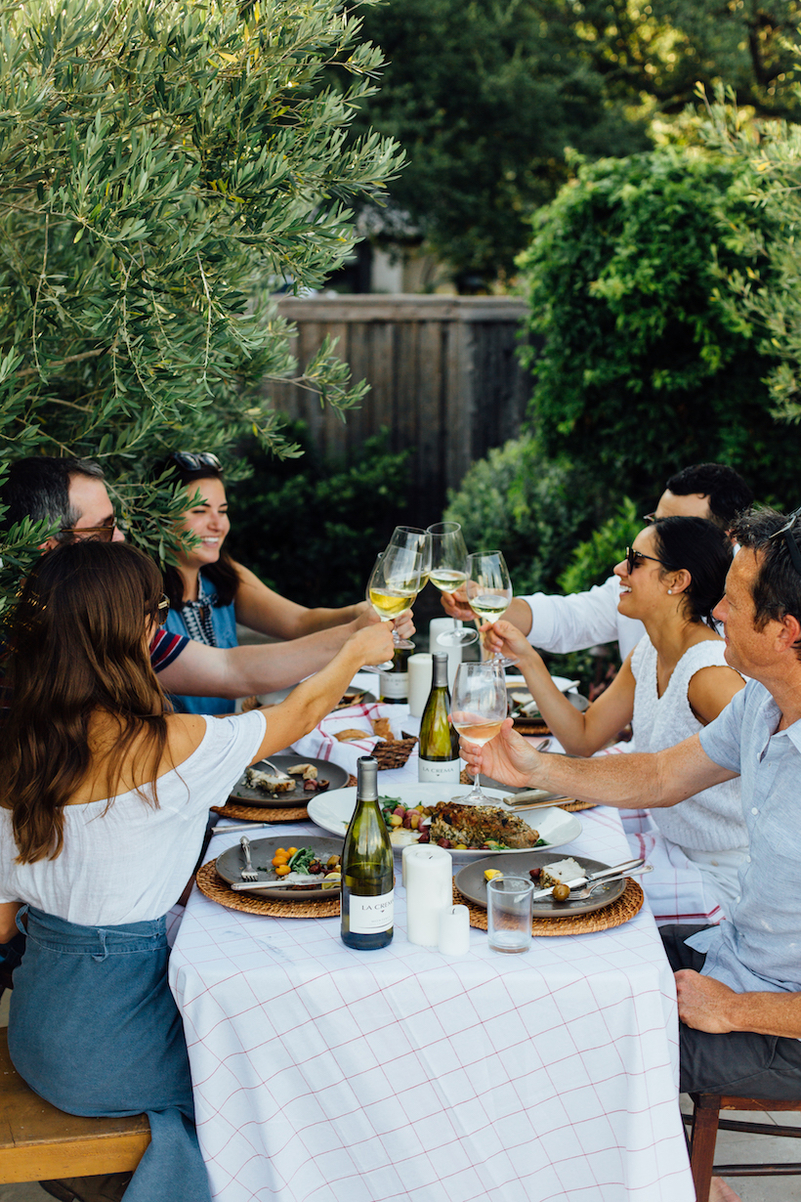Anyone else wake up on this Monday-after-Christmas feeling a little heavier than usual? The past month has been full of celebrating and decadence, and no, I don’t regret a single bite of shortbread cookies or almond cringle (or sip of red wine.) But over the last few years, being mindful about the way I choose to eat post-holiday has been key to feeling my best heading into the new year — and I think it’s also a big part of why I haven’t experienced the “holiday weight creep” that leads to most Americans gaining 10 – 20 pounds per decade.
While I used to want to combat periods of indulgence with extreme diet regimens (cutting out carbs, soup cleanses, etc.) I’ve realized that for me, a strategy that focuses more on how I eat is just as important as what I’m actually choosing to eat. I don’t like hard and fast rules when it comes to my diet — the idea of no bread or cheese or wine in my life sounds restrictive and counter to my YOLO-centric approach to enjoying life. A few years ago, I read a simple book by Marc David that I stumbled across on Amazon called The Slow Down Diet: Eating for Pleasure, Energy, and Weight Loss, and it changed everything about the way I thought about food.
In it, David posits that relaxed, mindful eating stimulates metabolic function — and that eating under stress encourages weight gain.
I’ve always heard that slowing down our eating helps us to eat less, but David’s research takes it a step further to show that being present while we eat actually changes our metabolism and the way our body digests our food. He busts the myth that finding our optimal weight is only about eating less and exercising more (a method that has left many of us on the frustrating cycle of losing weight only to gain it back.) Since I read the book and had this first aha moment (as in, “mind blown, this all makes so much sense now” moment), learning to put these mindfulness habits into practice has majorly influenced my relationship to food.
Around this time of year, I often find myself revisiting underlined sections of the book as a dietary refresh, so I thought I’d share the teachings that have been most game-changing in my own life. Read on, and I’d love to hear in the comments your thoughts on whether how you eat is as important as what you eat. And if you have any food resolutions you’re bringing into 2020, I’d love to hear those, too!
Bringing more awareness to our lives has a physical effect on our bodies.
“The Slow Down Diet is about slowing down life to speed up metabolism.
What I mean by “slowing down is becoming more aware: Open. Centered. Present. Balanced. Create this experience for yourself and your mind, body, and breath will naturally align in a synergistic state.”
David says that when we choose to “slow down,” we experience real effects on our nervous system, endocrine system, and immune system, and that our bodies will naturally start burning calories at an optimal rate. Our nutrients will be digested and absorbed more efficiently, and we’ll feel “alive, energized, and abundant.” I’m at a point in my life where the hamster wheel of restrictive eating and extreme cortisol-boosting exercise just sounds really unappealing and imbalanced. Instead, I want to embrace my body’s natural rhythms and trust that when I nourish it with high-quality foods, it’ll know what to do.
When we eat too quickly, our body enters a fight-or-flight response that shuts down our digestive system.
I haven’t always considered myself a fast eater. Then I had kids. When Phoebe was a baby, I found myself scarfing down meals before she woke up from her nap, bringing food with me in the car, and most of all, multitasking while I ate. A typical lunch for me meant squeezing in work at my computer while I devoured a salad. Have you ever finished a meal, and then been shocked that it was gone because you forgot to notice how anything actually tasted? Hand fully raised, and as someone who deeply loves food, that is a really unsatisfying feeling. In the book, David says:
“Can you recall what your body sensations are when you eat during a state of anxiety or stress? Most people report such symptoms as heartburn, cramping, gas, digestive pains, belching, and intense hunger. During stress, the body automatically shifts into the classic fight-or-flight response… In the moment the stress response is activated, heart rate speeds up, blood pressure increases, hormones that help provide immediate energy such as adrenaline and cortisol are release into the circulatory system, blood flow is rerouted away from the midsection toward the head for quick thinking.
Most importantly, in a full-blown stress response, the digestive system completely shuts down. It makes perfect sense that when you’re fending off an angry gorilla, you don’t need to waste energy digesting. All the body’s metabolic functions must be geared directly for survival.”
Eating in a relaxed state = optimal digestion.
Okay, so what exactly does this mean for the way that we eat? Well, it means that even when we consume the perfect balance of vegetables, carbs, fat, and protein, if we’re eating in a stressed-out state, our digestion and nutrient absorption is diminished. No amount of calorie counting will lead to optimum health and weight if we’re eating at turbo speed and forgetting to breathe and enjoy our food. On the flip side, getting into the right mental state when we eat — relaxed, calm, present — turns on the body’s full digestive power so we naturally know what to eat and how much.
Conscious breathing is one of the most powerful digestive tools we can implement today.
When I’m eating too fast and not staying present during my meals, I forget to breathe. And when I forget to breathe, I’m not chewing my food sufficiently and not awakening the full force of my body’s digestive power. I hate to admit that this situation happens all too often when I’m stressed-out and in a hurry, and one of my biggest dietary goals for 2020 is to bring more awareness to my breathing. David says:
“The road to shortcut the physiologic stress-response and bring you to relaxed, slow eating is conscious breathing…
When we are in a stressful state, if we consciously adopt the deep and rhythmic breathing pattern characteristic of the relaxed state, we fool the central nervous system… A signal is sent from the frontal cortex of the brain to target organs throughout the body. The result is a shift from a state of low digestive activity to full digestive force.”
David goes on to describe that a key factor in maximizing our metabolism is to take in more oxygen through deep breathing, since the digestive system needs oxygen to burn efficiently. There’s a lot more scientific detail in the book on this topic, but in a nutshell: we can get some aerobic benefit just by teaching ourselves to breathe more deeply while we eat.
***
This is Pt 1 of 3 in my Changing the Way You Eat series — check back in over the next few weeks when I’ll share more about exactly how I’m putting these ideas into practice, as well as how I’m using the way that I eat to combat some recent gut health issues I’ve been dealing with, specifically SIBO and Candida. I’d love to hear your thoughts below, and if you’re also excited to kickoff 2020 with nourishing, feel-good meals, make sure you’re signed up for our FREE #CSCleanse that launches on January 2nd!









